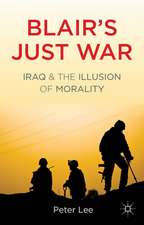Voices from Post-Saddam Iraq: Living with Terrorism, Insurgency, and New Forms of Tyranny: Praeger Security International
Autor Victoria Fontanen Limba Engleză Hardback – 29 dec 2008 – vârsta până la 17 ani
Din seria Praeger Security International
- 18%
 Preț: 334.19 lei
Preț: 334.19 lei - 8%
 Preț: 335.53 lei
Preț: 335.53 lei - 34%
 Preț: 376.10 lei
Preț: 376.10 lei - 46%
 Preț: 443.64 lei
Preț: 443.64 lei - 29%
 Preț: 240.11 lei
Preț: 240.11 lei - 8%
 Preț: 304.56 lei
Preț: 304.56 lei - 34%
 Preț: 373.82 lei
Preț: 373.82 lei - 19%
 Preț: 412.79 lei
Preț: 412.79 lei - 19%
 Preț: 338.42 lei
Preț: 338.42 lei - 18%
 Preț: 335.62 lei
Preț: 335.62 lei - 27%
 Preț: 377.35 lei
Preț: 377.35 lei - 27%
 Preț: 376.75 lei
Preț: 376.75 lei - 18%
 Preț: 336.46 lei
Preț: 336.46 lei - 18%
 Preț: 321.73 lei
Preț: 321.73 lei - 27%
 Preț: 384.51 lei
Preț: 384.51 lei - 18%
 Preț: 320.50 lei
Preț: 320.50 lei - 18%
 Preț: 320.50 lei
Preț: 320.50 lei - 18%
 Preț: 321.35 lei
Preț: 321.35 lei - 24%
 Preț: 420.54 lei
Preț: 420.54 lei - 14%
 Preț: 335.99 lei
Preț: 335.99 lei - 18%
 Preț: 355.82 lei
Preț: 355.82 lei - 18%
 Preț: 319.83 lei
Preț: 319.83 lei - 18%
 Preț: 334.28 lei
Preț: 334.28 lei - 32%
 Preț: 354.48 lei
Preț: 354.48 lei - 14%
 Preț: 335.14 lei
Preț: 335.14 lei - 38%
 Preț: 405.98 lei
Preț: 405.98 lei - 40%
 Preț: 571.34 lei
Preț: 571.34 lei - 18%
 Preț: 321.85 lei
Preț: 321.85 lei - 18%
 Preț: 323.25 lei
Preț: 323.25 lei - 18%
 Preț: 253.28 lei
Preț: 253.28 lei - 40%
 Preț: 571.50 lei
Preț: 571.50 lei - 14%
 Preț: 333.72 lei
Preț: 333.72 lei - 18%
 Preț: 301.73 lei
Preț: 301.73 lei - 19%
 Preț: 352.96 lei
Preț: 352.96 lei - 26%
 Preț: 387.80 lei
Preț: 387.80 lei - 18%
 Preț: 302.77 lei
Preț: 302.77 lei - 14%
 Preț: 333.91 lei
Preț: 333.91 lei - 17%
 Preț: 325.80 lei
Preț: 325.80 lei - 24%
 Preț: 338.58 lei
Preț: 338.58 lei - 34%
 Preț: 414.73 lei
Preț: 414.73 lei - 18%
 Preț: 354.30 lei
Preț: 354.30 lei - 29%
 Preț: 254.29 lei
Preț: 254.29 lei - 18%
 Preț: 354.11 lei
Preț: 354.11 lei - 18%
 Preț: 334.38 lei
Preț: 334.38 lei - 14%
 Preț: 302.68 lei
Preț: 302.68 lei - 18%
 Preț: 322.97 lei
Preț: 322.97 lei - 27%
 Preț: 376.50 lei
Preț: 376.50 lei - 27%
 Preț: 322.81 lei
Preț: 322.81 lei - 27%
 Preț: 382.91 lei
Preț: 382.91 lei - 18%
 Preț: 320.87 lei
Preț: 320.87 lei
Preț: 413.21 lei
Preț vechi: 570.08 lei
-28% Nou
Puncte Express: 620
Preț estimativ în valută:
79.07€ • 82.76$ • 65.81£
79.07€ • 82.76$ • 65.81£
Carte tipărită la comandă
Livrare economică 31 martie-14 aprilie
Preluare comenzi: 021 569.72.76
Specificații
ISBN-13: 9780313365324
ISBN-10: 0313365326
Pagini: 240
Dimensiuni: 156 x 235 x 23 mm
Greutate: 0.5 kg
Editura: Bloomsbury Publishing
Colecția Praeger
Seria Praeger Security International
Locul publicării:New York, United States
ISBN-10: 0313365326
Pagini: 240
Dimensiuni: 156 x 235 x 23 mm
Greutate: 0.5 kg
Editura: Bloomsbury Publishing
Colecția Praeger
Seria Praeger Security International
Locul publicării:New York, United States
Notă biografică
Victoria Fontan is Director of Academic Development and Associate Professor of Peace and Conflict Studies, at the United Nations-mandated University for Peace in San Jose, Costa Rica. Prior to this appointment, she was a Fellow to the Iraq Project at the Center for International Conflict Resolution at Columbia University. As a freelance journalist, Fontan has worked in Iraq for Deutsche Welle Radio and Television, for the Baghdad Bulletin, and for The Independent, based in the United Kingdom. Her many roles have also included serving as Research Fellow at Sabanci University in Turkey, Research Associate at the American University of Beirut in Lebanon, and Visiting Professor of Peace and Conflict Studies at Colgate University in New York.
Cuprins
AcknowledgementsMap of IraqIntroductionChapter 1: The Road to Hell is Paved WithChapter 2: Insurgency, the Sunnis and Humiliations RoleChapter 3: Abu Ghraib, A Source of Ethno-Religious UnrestChapter 4: The Gender Factor and How It May Hold Keys to PeaceChapter 5: The Post-Saddam Elections and How They Paved the Way for Civil WarChapter 6: Moving Beyond Humiliation, A New Role for The United States in Post-Saddam IraqConclusionBibliographyNotes
Recenzii
Fontan (peace and conflict studies, U. for Peace, Costa Rica) has worked as a freelance journalist in Iraq writing for Western and Iraqi media. Seeking to avoid condemning or condoning occupiers or occupied, liberators or liberated, she argues that primary factor ruling the people of Iraq since the arrival of the US military is humiliation. Her topics includeinsurgency, the Sunnis, and humiliation's role; Abu Ghraib as a source of ethno-religious unrest; the gender factor and how it may hold keys to peace; and a new role for the US in post-Saddam Iraq.














